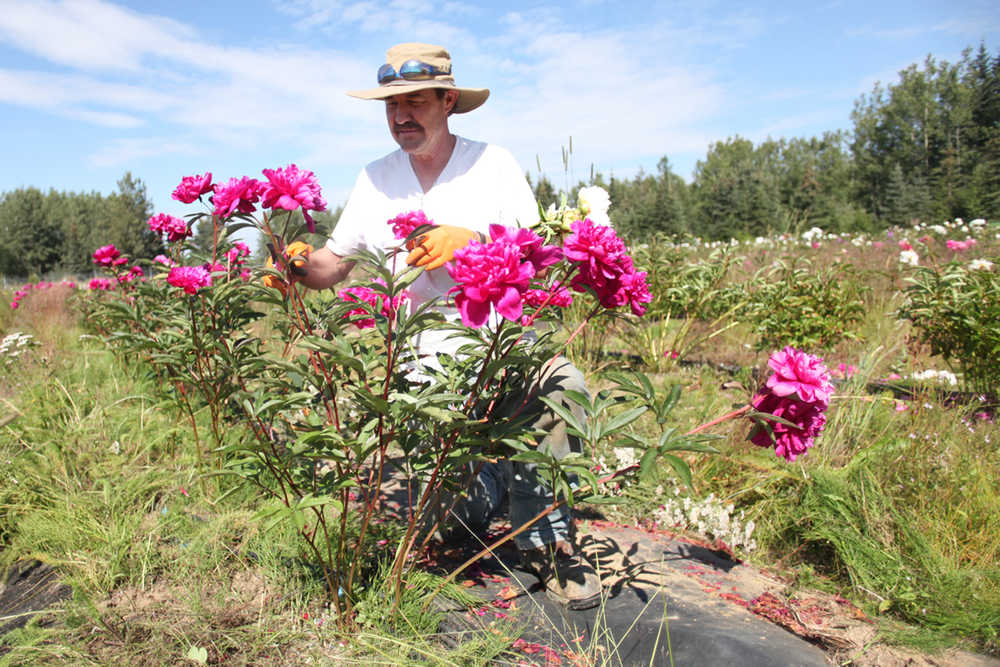Across the Kenai Peninsula, peonies were out in full bloom —long before their planters expected them.
With another sporadically freezing winter, followed by a warm spring, buds began to pop more than one month before their regular season, leaving growers without hands to cut and package stems, and competing with Lower 48 suppliers.
Usually, the fragrant, swollen perennials flower from mid-July through August. At least, that’s what was considered normal when Rita Jo Shoultz started Alaska Perfect Peony one decade ago.
Alaska’s first peony farmers could expect a thick cover of snow to protect plants from the vicious freeze-thaw cycle that has been plaguing producers for the past four years. Regular flurries also keep ice from infiltrating, splitting and rotting root balls underground, which has taken a few local operations out of the running entirely.
Between 2014 and 2015 Richard and Irene Repper lost nearly 65 percent of what they put into the ground in their first five years as the owners of Echo Lake Peonies in Soldotna, although they have managed to keep operations on track by adapting to the erratic seasons as many peony farmers are forced to do year after year.
It is around mid May when the absent stems and accompanying foliage are first noticed, Repper said.
By now, growers are at least expecting some die off. Trying to sell in June along with producers in the Midwest and East Coast was a surprise.
Shoultz guesses a warmer spring season is to blame for early blooms this season.
“We were not prepared,” she said.
Shoultz had barely finished construction on the new coolers she added this year to store her picked stems awaiting shipment. She also happened to be out of town the week the balled buds started preparing to burst.
“I have never cut a stem that early,” Shoultz said. “I am gone and my cutters are cutting like crazy and all the flowers are coming to a head and I have got a new crew processing.”
Annually, Shoultz’s farm, which is one of the largest and oldest peony operations in Alaska, produces nearly 40,000 stems within the three-week harvesting window.
Peonies are picked before petals begin to protrude. A pinch of bright pink or vibrant white can be seen through a green encasement, and the buds are a little less than firm to the touch, when they are cut and placed into freezers that sit at roughly 34 degrees Fahrenheit until sent to a bride, florist or wholesaler.
Repper said she and her husband did not have labor lined up, and their coolers, which can take days to reach desired temperatures, were not even turned on. Still, she said this has been one of her most stress-free summers in awhile with less labor required to keep things going.
The Reppers did ship some of their product out of state, but have been selling many stems at the local farmers markets, in open U-Pick hours, by appointment and a few through the Kenai Peninsula Food Hub, which Repper said she is going to utilize more heavily next year.
Repper said, while the winters have not been what they were when many growers first started out, farmers are finding ways to mitigate the damages.
Mulch or plastic coverings can keep ice from forming if someone can keep digging in their pockets, Repper said. For producers who might not want to put as much time into sales in Lower 48 and worldwide markets, local buyers may be another option, and can alleviate 4 a.m. shipments, hours of advertising and time in the field cutting stems.
Shoultz said she already has three leaders ready for next year so processing can begin immediately. She said she had to cancel multiple orders this year.
“Cancelling the orders is really horrible,” Shoultz said. “As soon as we thought we might have a problem tried to give everyone notice.”
Most of Shoultz’ clients have been sympathetic, understanding the situation is caused by weird weather. She sent notifications five weeks in advance so planners had time to figure out how to find other flowers for their events.
“We have more market than we have product,” Shoultz said. “We have been able to sell everything that we cut and process, that doesn’t mean we sell everything we cut.”
Shoultz both said sometimes there is a little product loss in the field if peonies don’t make it into colder temperatures right away.
Right now, the Reppers are mostly doing clean up — disbudding, deadheading and weeding. New blooms, bobbing in their neat rows between deep green foliage, are still popping out and up for sale, the rest will be saved in coolers for a few more weeks.
Reach Kelly Sullivan at kelly.sullivan@peninsulaclarion.com.

